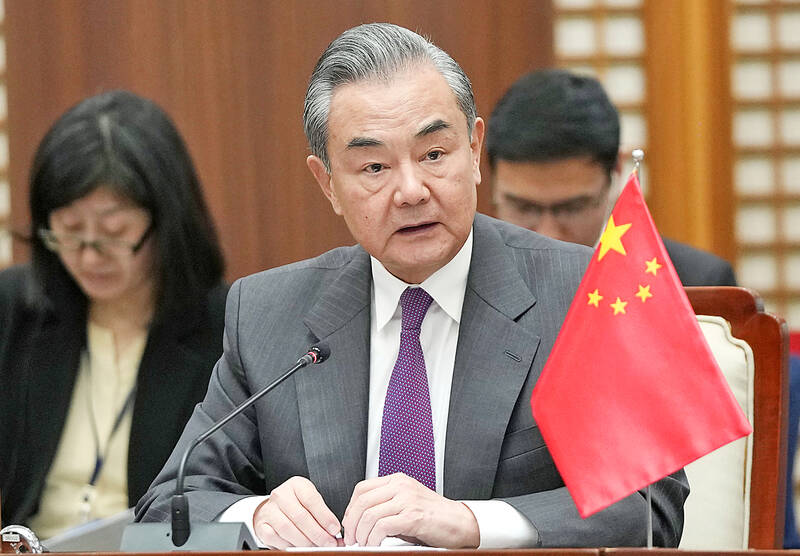Beijing is to maintain military pressure on the Philippines amid a dispute over sovereignty in the South China Sea, Chinese Minister of Foreign Affairs Wang Yi (王毅) said on Wednesday.
In a phone conversation with the Philippine Secretary of Foreign Affairs Enrique Manalo, Wang “warned that if the Philippine side misjudges the situation, goes its own way or even colludes with ill-intentioned external forces to continue to stir up troubles, China will defend its rights in accordance with law and respond resolutely,” Chinese state-run Xinhua news agency reported.
Wang’s comments follow China’s mobilization of its coast guard and maritime militia to block Philippine supply missions to support its soldiers and fishers. China claims sovereignty over virtually the entire South China Sea, one of the world’s most crucial waterways for shipping, putting it at odds with the Philippines, Taiwan, Vietnam, Malaysia and Brunei.

Photo: AP
Wang was quoted as saying the Philippines was “changed its policy stance so far, reneged on the promises it has made, provoked troubles at sea, and undermined China’s legitimate and lawful rights.”
“Noting that the bilateral relationship now stands at a crossroads, with its future yet to be decided, Wang said the Philippine side must act with caution,” Xinhua reported yesterday.
“Instead of continuing in the wrong direction, the Philippine side should return to the right path as soon as possible, with properly handling and managing the current maritime situation as a top priority,” Wang was quoted as saying.
Wang gave no details on what agreements Manila had allegedly abandoned.
Manalo’s office described the the conversation as a “frank and candid exchange,” saying the sides had reached a “clearer understanding of our respective positions on a number of issues.”
Territorial disputes have grown tenser as China seeks to cement its territorial claims in defiance of the US and its allies, the Philippines, Japan, South Korea and close partner Taiwan.
The head of the Philippine military was with his forces aboard a supply boat when it was blasted with a water cannon, surrounded and bumped by Chinese coast guard ships earlier this month in the disputed South China Sea.
China, meanwhile, accused the US of encouraging the Philippines, its treaty ally, to provoke China for its own purposes, though it provided no direct evidence.
Along with using water cannons, Philippine officials said that Chinese coast guard ships used a military-grade laser that caused Filipino crew members temporary blindness, and engaged in dangerous blocking and shadowing maneuvers that caused minor collisions.
Washington is bound by a 1951 treaty to help defend the Philippines from attack. That pledge has grown stronger with the election of Philippine President Ferdinand Marcos Jr, who recently said that the situation in the South China Sea “has become more dire” as China expands its presence.
China has showed interest in atolls and shoals that are “closer and closer” to the coast of the Philippines, with the nearest atoll about 60 nautical miles (111km) away, Marcos said during a visit to the US state of Hawaii last month.

A car bomb killed a senior Russian general in southern Moscow yesterday morning, the latest high-profile army figure to be blown up in a blast that came just hours after Russian and Ukrainian delegates held separate talks in Miami on a plan to end the war. Kyiv has not commented on the incident, but Russian investigators said they were probing whether the blast was “linked” to “Ukrainian special forces.” The attack was similar to other assassinations of generals and pro-war figures that have either been claimed, or are widely believed to have been orchestrated, by Ukraine. Russian Lieutenant General Fanil Sarvarov, 56, head

SAFETY FIRST: Double the number of police were deployed at the Taipei Marathon, while other cities released plans to bolster public event safety Authorities across Taiwan have stepped up security measures ahead of Christmas and New Year events, following a knife and smoke bomb attack in Taipei on Friday that left four people dead and 11 injured. In a bid to prevent potential copycat incidents, police deployments have been expanded for large gatherings, transport hubs, and other crowded public spaces, according to official statements from police and city authorities. Taipei Mayor Chiang Wan-an (蔣萬安) said the city has “comprehensively raised security readiness” in crowded areas, increased police deployments with armed officers, and intensified patrols during weekends and nighttime hours. For large-scale events, security checkpoints and explosives

‘POLITICAL GAME’: DPP lawmakers said the motion would not meet the legislative threshold needed, and accused the KMT and the TPP of trivializing the Constitution The Legislative Yuan yesterday approved a motion to initiate impeachment proceedings against President William Lai (賴清德), saying he had undermined Taiwan’s constitutional order and democracy. The motion was approved 61-50 by lawmakers from the main opposition Chinese Nationalist Party (KMT) and the smaller Taiwan People’s Party (TPP), who together hold a legislative majority. Under the motion, a roll call vote for impeachment would be held on May 19 next year, after various hearings are held and Lai is given the chance to defend himself. The move came after Lai on Monday last week did not promulgate an amendment passed by the legislature that

A magnitude 7.0 earthquake struck off Yilan at 11:05pm yesterday, the Central Weather Administration (CWA) said. The epicenter was located at sea, about 32.3km east of Yilan County Hall, at a depth of 72.8km, CWA data showed There were no immediate reports of damage. The intensity of the quake, which gauges the actual effect of a seismic event, measured 4 in Yilan County area on Taiwan’s seven-tier intensity scale, the data showed. It measured 4 in other parts of eastern, northern and central Taiwan as well as Tainan, and 3 in Kaohsiung and Pingtung County, and 2 in Lienchiang and Penghu counties and 1